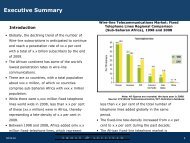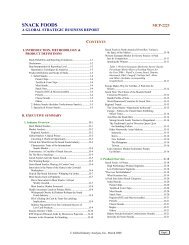the RUSSIA oil & gas competitive intelligence report - Report Buyer
the RUSSIA oil & gas competitive intelligence report - Report Buyer
the RUSSIA oil & gas competitive intelligence report - Report Buyer
Create successful ePaper yourself
Turn your PDF publications into a flip-book with our unique Google optimized e-Paper software.
Russia Oil and Gas Competitive Intelligence <strong>Report</strong> 2010<br />
Under a deal to solve <strong>the</strong> crisis, Belarus agreed that Russia would increase <strong>gas</strong> export prices to<br />
US$100/mcm ra<strong>the</strong>r than <strong>the</strong> initially planned US$200/mcm. The price <strong>report</strong>edly increased to<br />
US$119/mcm in 2008. In return for <strong>the</strong>se subsidised rates, Belarus allowed Gazprom to purchase 12.5%<br />
of its state <strong>gas</strong> transit company Beltransgaz annually from 2008 to 2010 for a total payment of<br />
US$2.5bn. Gas prices continued to rise in 2009, averaging US$150/mcm. During <strong>the</strong> winter period of<br />
peak demand, prices rose fur<strong>the</strong>r from US$121.98/mcm in Q409 to US$169.22/mcm in Q110. In<br />
response, Beltransgaz started paying for <strong>gas</strong> at <strong>the</strong> lower rate of US$150/mcm, <strong>the</strong> average 2009 price.<br />
Gazprom claims that Beltransgaz owes US$137.49mn for <strong>gas</strong> imports in <strong>the</strong> peak period of Q110. This<br />
amount is set to increase, and Gazprom estimates that at this rate Belarus's <strong>gas</strong> debt could reach<br />
US$500mn by <strong>the</strong> end of 2010.<br />
In BMI’s view <strong>the</strong> current situation is unsustainable and is likely to lead to a renewed flare-up of <strong>the</strong> two<br />
countries’ long-running dispute unless Belarus agrees to pay <strong>the</strong> higher price demanded by Russia. One<br />
possible outcome is that Belarus will offer Russian companies an increased stake in its main energy<br />
infrastructure companies, most likely in Beltransgaz and Belarus’s Mozyr refinery.<br />
Kazakhstan<br />
Russia and Kazakhstan in September 2010 agreed to start jointly developing <strong>the</strong> Imashev <strong>gas</strong> and<br />
condensate field, which straddles <strong>the</strong> border of <strong>the</strong> two countries. The move follows a five-year period of<br />
near inactivity at <strong>the</strong> field, following a deal in January 2005 demarcating <strong>the</strong> Russia-Kazakhstan border.<br />
This progress on <strong>the</strong> field's development is a sign of Russia and Kazakhstan's willingness to cooperate on<br />
<strong>the</strong> development of shared resources.<br />
The Imashev field is located on <strong>the</strong> border between Russia's Astrakhan Oblast and Kazakhstan's Atyrau<br />
Province near <strong>the</strong> Caspian Sea. The field is Kazakhstan's second largest <strong>gas</strong> field after Karachaganak,<br />
according to Kazakh news agency IRBIS, but it has not been developed owing to a dispute over <strong>the</strong><br />
border with Russia. In January 2005, however, <strong>the</strong> two countries signed a border demarcation agreement<br />
under which Kazakhstan ceded a border village covering part of <strong>the</strong> field to Russia, in return for territory<br />
elsewhere and an agreement to develop <strong>the</strong> field jointly with Russia.<br />
Following <strong>the</strong> Seventh Forum of Russia-Kazakhstan Inter-Regional Cooperation held in Ust-<br />
Kamenogorsk on September 6-7 2010, <strong>the</strong> two countries announced that <strong>the</strong>y have now agreed to survey<br />
<strong>the</strong> field's reserves and prepare it for development. Russia's ITAR-TASS news agency <strong>report</strong>ed that <strong>the</strong><br />
field has estimated reserves of 128.7bcm of <strong>gas</strong> and 20.7mn tonnes of <strong>gas</strong> condensate, equivalent to<br />
186.6mn bbl. Kazakh <strong>oil</strong> minister Sauat Mynbayev said that <strong>the</strong> field will be <strong>the</strong> first to be developed on<br />
<strong>the</strong> territory of <strong>the</strong> two states.<br />
O<strong>the</strong>rs<br />
In May 2009, Japan and Russia signed a raft of energy cooperation deals. The deals include a joint <strong>oil</strong><br />
exploration agreement, an accord that will see Russia supply enriched uranium to Japan, and a MoU to<br />
© Business Monitor International Ltd Page 13









